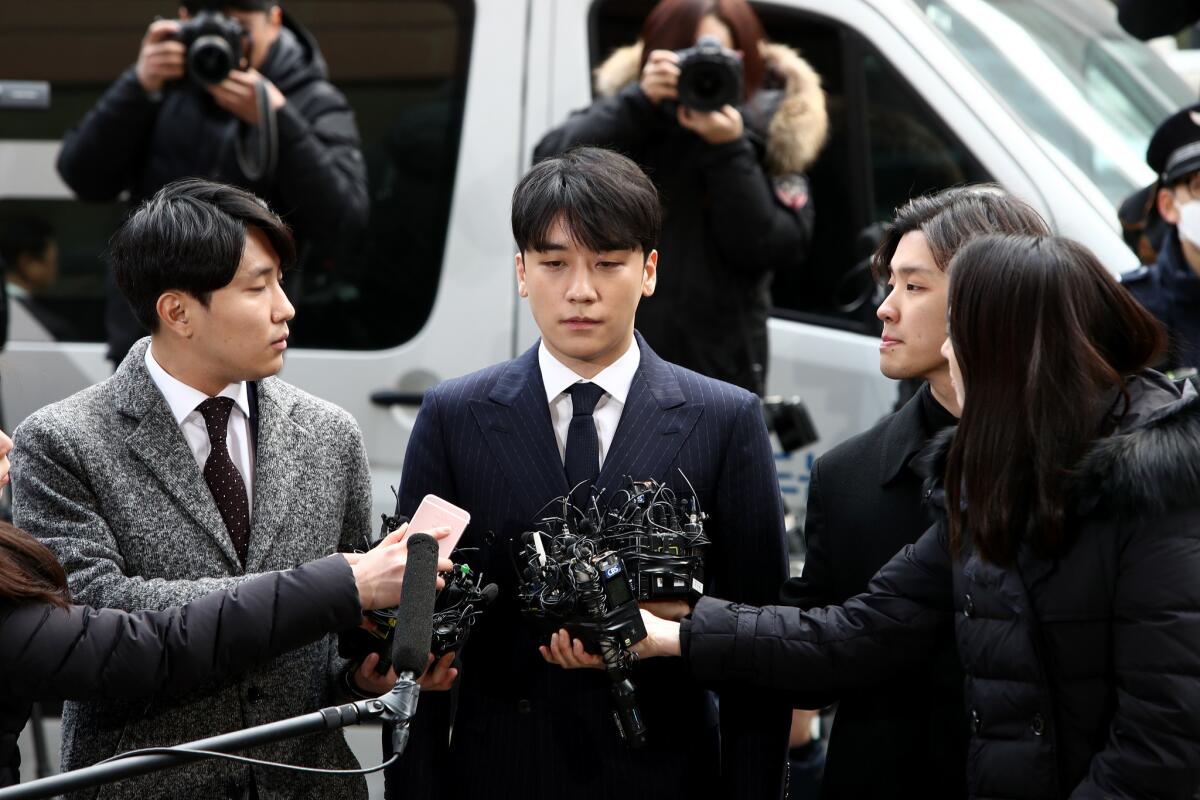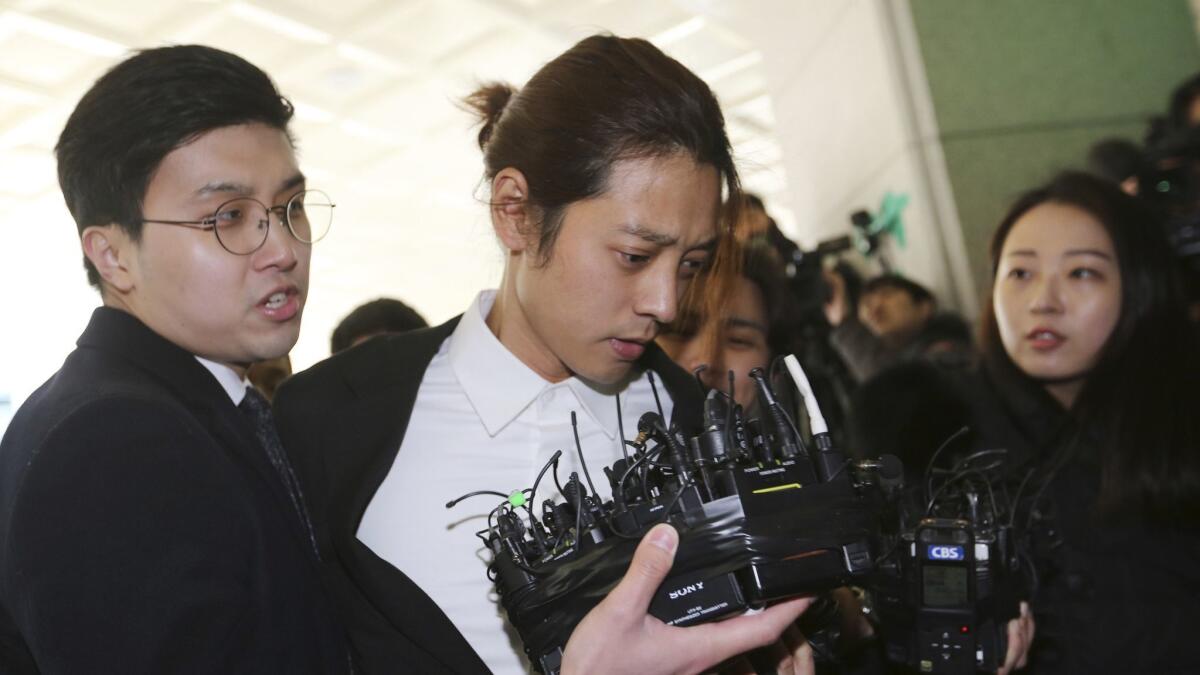K-pop’s K-porn problem: Growing scandal highlights South Korea’s spy-cam epidemic

Reporting from Seoul — It started a few years ago with a small group of young men texting each other evidence of their sexual exploits — photographs and videos allegedly made without consent of the women who appeared in them.
It might have ended there too, if some of the participants were not stars of K-pop, South Korea’s multibillion-dollar music industry.
Some of K-pop’s biggest names have been implicated in an evolving police investigation that has shaken the country.
Jung Joon-young, 30, a wiry, tousle-haired guitarist who rose to fame through a Korean version of “American Idol,” was arrested March 21 on suspicion of filming at least 11 women without their consent and distributing the footage.
Lee Seung-hyun — a 28-year-old better known as Seungri of the boy band Big Bang, whose members have been called the “Kings of K-pop” — faces a host of charges, including illegally recording women.
Three other stars have apologized, quit their bands or been subjected to police questioning.
The growing scandal has tarnished K-pop with allegations of bribery, police corruption, prostitution and drug dealing.
Empowered by #MeToo, a new generation fights sexual abuse in South Korea’s schools »
But above all, it has turned a spotlight on another national industry: illicit sex videos filmed or distributed without consent and widely consumed through a thriving black market.
What the music stars are accused of doing is surprisingly widespread in South Korea, where all production and distribution of pornographic material is against the law.
Such recordings are a problem elsewhere in the world but have proved particularly endemic in South Korea — so much so that in his 2017 election campaign President Moon Jae-in made increased punishment in such cases part of his platform.
That K-pop stars were also partaking is “not surprising at all; it’s just showing how prevalent this problem is,” said Lee Hyo-rin, an activist with the Korea Cyber Sexual Violence Response Center, which helps victims whose videos have spread online. “It feels like deja vu. This case is only getting all this attention because the perpetrator is famous.”

The videos are known in Korean as “molka,” an abbreviation meaning hidden camera. Many are uploaded from South Korea onto pay-per-view websites with servers located overseas.
The illicit footage includes hidden-camera recordings and videos made consensually but distributed without agreement. Some have been filmed on spy cams disguised in eyeglasses, pens or lighters — which have been sold at stores advertising them alongside Viagra.
A police cybercrimes squad announced in recent weeks that it had arrested four people who had installed spy cams in dozens of hotel rooms and streamed the private moments of at least 1,600 guests on a website that charges $45 a month for a subscription.
Many videos are also distributed on file-sharing websites, which typically charge 10 Korean won, or about a cent, for every 100 megabytes of data.
In an anonymous interview with a South Korean television news program last year, one man claimed he was making as much as $350,000 a year by uploading his cache of illegal pornography — millions of hours of video.
It’s difficult to gauge the full magnitude of the problem, because many of the sites frequently shut down and reopen under different names in order to dodge authorities. A 2015 survey found 85% of male college students in South Korea consumed porn — despite it being illegal.
Ironically, that blanket restriction appears to encourage homemade sex videos and the black market for them, especially as the government has also strengthened enforcement of copyright laws, cracking down on illegal sharing of professionally produced pornography from Japan and the U.S.
The popularity of hidden-camera porn has also been attributed to a prevalent and deep-seated misogyny that views women not as equal sexual partners but as conquests.
“It’s a culture that views women as an object of consumption,” said Lee Na-young, a feminist scholar and a sociology professor at Chung-Ang University in Seoul.
Since the South Korean government started a hotline for victims last April, more than 2,300 victims — over 90% of them women — have come forward asking for help, according to the Ministry of Gender Equality and Family.
The hotline offers legal and psychological counseling, as well as services to scrub images and videos off the web.
It’s not easy. In the case of one woman who turned to the government support center for help, videos of her were uploaded more than 2,700 times over a period of six months. One of the videos was viewed or downloaded more than 400,000 times, according to the ministry.
The problem has even created a cottage industry that provides 24/7 monitoring and scrubbing at a steep price.
Kim Ho-jin, the owner and chief executive of one of the for-profit companies, charges about $1,760 a month for his around-the-clock deletion service. He said he tells potential customers the service is well worth the cost, especially in South Korea, where an explicit video could mean the end of a woman’s social or professional life.
“I tell them, even if you take out a debt, you need to get it deleted,” he said. “Your life will be over because of this; you’ll be forced to live in hiding.”
Kim says he provides the deletion free of charge to teenagers who he knows aren’t able to pay for it themselves but don’t want to explain their situation to their parents.
Among Kim’s clients was a schoolteacher who had a camera memory card containing explicit videos of her stolen while she was in college. Years later, as a teacher in training, she learned from students that some of the material had been uploaded, and she was fired from the school.
After she tried to kill herself by jumping off a bridge over the Han River, her mother sought out Kim’s services, Kim said.
There is no indication that the K-pop stars were profiting from their sex videos or sharing them outside their small group, which traded the material over the popular South Korean app Kakao Talk.
The chain of events that brought their secret to light began last November in Seoul’s trendy Gangnam district with a fight at a nightclub partially owned by Seungri.
A man said that he was beaten up by club employees and that police appeared eager to cover up the incident and physically attacked him.
After the man went public with his allegations, an investigation turned up evidence that the club was a site of rampant drug dealing, prostitution and sexual assault fueled by date-rape drugs, according to police.
As the inquiry deepened, an informant sent an attorney a cache of sexually explicit messages the stars and several friends had exchanged in 2015 and 2016.
The attorney, Bang Jeong-hyun, turned them over to a governmental anti-corruption and civil rights commission, suspecting police complicity in covering up for the K-pop stars.
The scandal erupted when the media got hold of several messages in which the K-pop stars bragged about their sexual conquests, joked about gang rape and discussed drugging women.
Invariably, when one member of the group would boast about having sex, another would ask if there was video. Often there was, according to police.
Distribution of sexual material filmed without consent can be punished by a sentence of up to 7½ years under South Korean law, according to Bang, who has represented creators, distributors and victims.
Bang said perpetrators often didn’t even think of their acts as criminal, and passed around the videos like trophies.
He now represents multiple women illegally filmed by the K-pop stars, he said.
“They want punishment for the perpetrators but are even more fearful that their identities will become known,” Bang said. “In Korean society, even if you’re the victim of illegal filming and distribution of a sexual encounter, you might still be blamed for your decisions. It’s not easy for them to bear that and come forward.”
More to Read
Sign up for Essential California
The most important California stories and recommendations in your inbox every morning.
You may occasionally receive promotional content from the Los Angeles Times.











